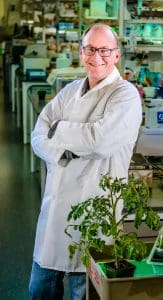Relief-of-Repression Strategy for Improving Plant Growth and Pest Resistance
Dr. Gregg Howe
MSU Foundation Professor, Department of Biochemistry and Molecular Biology
 It is generally understood that a plant has a limited amount of energy to allocate to different processes, creating a tradeoff between using energy to grow quickly to compete for sunlight versus using energy to fight off diseases and pests.
It is generally understood that a plant has a limited amount of energy to allocate to different processes, creating a tradeoff between using energy to grow quickly to compete for sunlight versus using energy to fight off diseases and pests.
A common technique farmers employ to increase crop yields per acre is by increasing the density of the crop planting. This forces the plants to compete for sunlight, resulting in faster growth. Because of the tradeoff between growth and defense, this significantly lowers the crops’ defenses, requiring farmers to use pesticides in order to counter the risks from plant diseases and pests. This also creates a major roadblock to developing improved crop varieties, because farming practices force plants into the fast-growth, low defense mode.
Thanks to his breakthrough research, Dr. Howe and his team are the first to have found a way to free plants from this energy tradeoff. By altering a defense hormone repressor and “knocking down” a light receptor of an Arabidopsis plant, a plant is can now both grow fast while simultaneously defending itself against insects and pathogens.
Currently, the Howe lab is translating the “relief-of-repression” strategy from a model laboratory plant to crop plants. Successful translation of this approach to crops will have major implications for agriculture. Agricultural production needs to increase by 70 percent to 100 percent in order to feed the world’s growing population, which is expected to reach nine billion by 2050. Relief-of-repression promises to increase productivity while lowering pesticide inputs.
MSU Technologies is pleased to recognize Dr. Howe and his team for their research and innovation.
